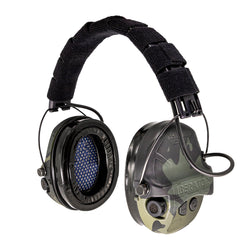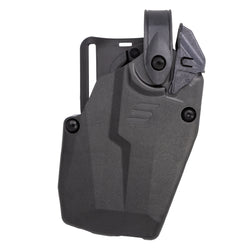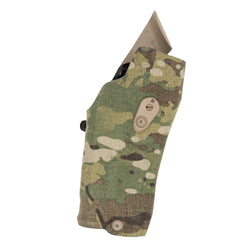Let’s go around the world! Virtually of course. On our trip around the world let’s explore the wide world of military service handguns.
These weapons are fairly diverse, and we aim to tackle some of the most popular on the market, as well as explore some guns that occupy the holsters of what we’d describe as nonallied forces.
Service handguns are fascinating to me and tend to be more varied and interesting than other military firearms. It’s also a good way to see the direction of handgun technology and to see what’s working around the world.
We are looking at general-issue handguns. Special Operations, military police, and similar units might use some oddities in small numbers, and while that’s notable they’re not on our list.
SIG P320: United States, Australia, Canada, Ukraine, and Denmark
SIG’s first striker-fired polymer-frame pistol has proven to be quite successful. Like most modern guns, it’s a double-stacked design, and in modern military forces, the caliber of choice is 9mm.

It’s the first polymer-frame military service handgun used by the United States. One of the key features of the P320’s success is its modularity. The weapon uses a serialized fire control group that can be easily moved to different grip modules and slide lengths.
The United States used this capability and adopted the P320 as the M17 and M18 series, the M17 being a full-sized design and the M18 being a carry-sized model. The US Military adopted the Safariland 7TS with the ALS and SLS retention devices alongside the M17/M18.
SIG has released what seems like a dozen different versions of this gun and the varied military forces have adopted a few different models.
The United States adopted an optics-ready variant with a manual safety, and by extension so has Ukraine. Australia adopted the XCarry Pro and Denmark adopted the XCarry model. Canada adopted both the full-sized and compact models.
HK USP: Germany, Estonia, Georgia, Ireland, Lithuania, and Spain
The HK USP can trace its origins back to the US Military’s Offensive Handgun Project. The development of the Mk 23 led to the creation of one of the most durable, and accurate modern service pistols.
HK took the lessons learned from the Mk 23 and produced the USP, or Universal Self-Loading Pistol. This is a hammer-fired, DA/SA pistol that comes in both full-sized and compact variants, as well as tactical and sport models.
The HK USP series offers shooters numerous safety and decocker variants, as well as a double action only design.

Numerous military forces can pick and choose their preferred model and safety/decocker configuration. The USP has proven itself over and over to be one of the most robust handguns on the market and it’s easy to see why it’s so well regarded by military forces around the world.
Ireland, Georgia, and Lithuania have adopted the standard full-sized model. Estonia and Spain went with the compact variant, and Germany is the sole military adopter of the threaded barrel tactical variant. The USP is a natural option for forces looking for a robust military service handgun.
Browning Hi-Power: India, North Korea, Uruguay, Indonesia, and Malaysia
If I had written this article only a few years ago the Browning Hi-Power would have ruled the roost. The Hi-Power served with dozens if not hundreds of military forces.
As one of the first true wonder nine handguns the Hi-Power was massively successful and only recently have countries like Canada, the UK, and many more traded their Hi-Powers in for more modern handguns.
The fact the gun is from the 1930s and still serves with varied military forces is a testament to its staying power. Most in-service Hi-Powers are either made by FN out of Belgium or Inglis from Canada.

However, in countries like India, they use a locally made variant. The classic single-action-only Hi-Power uses a 13-round magazine, but modern magazines can accommodate up to 17 rounds.
While it’s older, it’s not too far behind most modern pistols. Sure, it can’t accept a light or optic, but as far as a combat handgun goes, it’s still a capable option. The Hi-Power series will likely continue to be a military service handgun for another couple of decades.
CZ 75: Czech Republic, North Macedonia, and Slovakia
The CZ-75 series sits in the same boat as the Hi-Power in terms of popularity. The classic CZ-75 series has been a military service handgun with dozens of countries but has slowly faded to the back burner with the rise of a polymer frame, striker-fired pistols. Unlike the Hi-Power, the CZ-75 has continued to evolve and grow to meet modern demands.
The CZ-75 series are double-stack 9mm handguns with DA/SA triggers. CZ makes numerous variants with safeties, decockers, and more.

The CZ 75 is a bit of an amalgamation of the Hi-Power and the SIG P210. It’s well known for its accuracy, low recoil, and dependability.
The Czech Republic uses the CZ 75 SP-01 Phantom, which features a modern accessory rail. North Macedonia still uses the classic CZ-75. Slovakia had adopted the polymer frame CZ 75 P09 series, which adds a modular safety/decocker and an accessory rail on top of a 19-round magazine.
The Glock 17: United Kingdom, France, Bangladesh, Finland, Indonesia, Israel, Latvia, Poland, and Dozens More
The current most widely issued military service handgun is the Glock 17 series. It’s spread its way across the world to armed military forces both big and small. The Glock 17’s success makes it akin to the new Hi-Power in many ways.
This full-sized, 9mm handgun is one of the original polymer frame, striker-fired pistols. The simplicity of the platform makes it incredibly attractive as a military service sidearm. It’s easy to work on and easy to fix.

The gun uses very few parts compared to other options. It’s also remarkably reliable, affordable, and designed to last nearly forever with minimal maintenance. The full-length Glock 17 slide offers a great sight radius and even optics compatibility.
The Glock 17 sits in the holsters of numerous military forces. While we’ve focused primarily on general issues, it bears mentioning that numerous special operations units prefer the Glock 17, as do military police forces. It’s one of the most common handguns among military forces and serves in deserts, swamps, and frozen plains.
China: QSZ-92
The Chinese have famously ripped off designs from SIG, Glock, Beretta, and more, but their standard military service handguns are the QSZ-92. The Type 92 Handgun is a semi-automatic, magazine-fed handgun that uses a recoil-operated system. The gun was developed in the early 1990s and features a removable fire control unit that can be moved between polymer frames and slides.
The pistol was produced in both standard 9×19 and the Chinese-developed 5.8x21mm cartridge. The removable FCU seems to be designed to allow the user to move the FCU and swap between calibers. The military appears to use both calibers, with the 5.8x21mm being the dominant military option.

The magazine holds 20 rounds of 5.8x21mm, and the cartridge can pierce soft body armor. Due to what’s likely the hard steel used to create the projectile, the barrel life is only eight to ten thousand rounds.
The QSZ-92 is an interesting military service sidearm. I’m curious about its battlefield performance.
Russia: MP-443 Grach
Pistols like the old Makarov are still widely issued in the Russian Federation military, but the official sidearm is the MP-443 Grach. The MP-443 Grach is a double stack, short recoil operated, semi-auto pistol that’s hammer fired.
Unlike previous Russian firearms, this gun uses the NATO standard 9×19 cartridge. Russia did develop the semi-armor-piercing 7N21 cartridge, which offers some additional penetrative power over standard 9mm cartridges. The gun holds 18 rounds of 9mm, a notable improvement over the ancient Makarov pistols.

The issue is a very slow production rate. The pistol was officially adopted in 2003, but fielding the gun is still taking place.
The Grach isn’t remarkable, but it shows a willingness for the Russian military to modernize to a degree. The pistol lags behind most Western designs and lacks the modularity of most military service handguns.
The World of Military Service Handguns
The choices of modern military forces tell us a story. There is clearly a move away from metal frame pistols and into polymer frame designs. Striker-fired guns are closing the gap with hammer-fired guns, but the hammer-fired designs are holding out. Features like light rails and optics cuts will likely be the next big step forward.
Regardless of which direction military forces around the world move, the holsters at Safariland will provide top-notch duty holsters with unbeatable retention.









